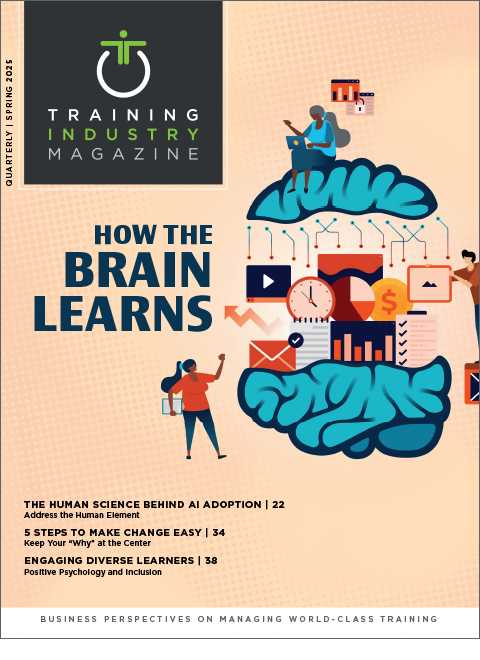
Published in Spring 2025
“I don’t know.”
No one likes to hear it. Customers find it frustrating. Employees feel deflated saying it. In some jobs, not knowing can lead to serious consequences. Yet, “I don’t know” remains a common workplace issue, often exposing gaps in organizational learning practices.
Worse than “I don’t know” is the time wasted overcoming it. Searching for answers often involves sifting through scattered resources across SharePoint sites or Teams channels. McKinsey found employees spend an average of 1.8 hours per day searching for information. That’s equivalent to 1 in 5 employees doing nothing but looking for help.
AI Enters the Chat
Tech vendors are making bold claims about artificial intelligence’s (AI’s) ability to revolutionize knowledge sharing. It’s easy to see why people are excited. Who wouldn’t want a digital co-worker that can pinpoint the exact information you need, tailor it to your role and present it in your preferred language?
While AI holds great promise — and more organizations are finding value every day — it raises a critical question: How will tech shift what employees need to know? Does expertise still matter in an AI-enabled workplace? The answer isn’t a simple yes/no. Rather, it requires rethinking how knowledge is developed and applied on the job. AI won’t render knowing obsolete, but it will force us to reprioritize our learning and development (L&D) efforts.
The Case for Knowing
There are certain things people must know to do their jobs well. A manufacturing worker must use personal protective equipment correctly to stay safe. A server must recall menu ingredients to address dietary concerns. Every role has “need-to-knows.” AI doesn’t change that — as long as people are still doing the work.
Then there’s everything else — additional knowledge that helps employees excel. “Nice-to-knows” might include troubleshooting tips or upselling techniques. Essential and supplementary knowledge are often off balance. Subject matter experts push excessive detail into training while L&D overloads employees with upfront information. This overwhelms people’s limited memories, reduces training effectiveness and hinders performance.
Restoring Balance
Modern tech gives us a chance to rebalance the learning experience. “Can employees complete the task correctly without this knowledge?” If yes, make the info available on-demand via performance support. If no, include it in structured training to make sure people understand the basics.
Instead of overloading employees on day one, teach them how to handle “I don’t know” moments on their own. In contact centers, the first thing we taught new agents was how to navigate our knowledge base. This dramatically reduced onboarding time while empowering employees to solve problems — and this was years before AI advanced our performance support capabilities.
More Than a Crutch
Tech can also help employees retain critical knowledge. By analyzing training history and performance data, AI-powered systems deliver personalized refreshers tailored to individual needs. For example, if an employee’s customer service scores are low, the system can nudge the manager to have a targeted coaching conversation.
Additionally, AI facilitates techniques like spaced learning and retrieval practice. For example, a learning management system (LMS) can deliver daily practice activities to reinforce key concepts, ensuring employees retain critical need-to-know information that directly impacts their performance. This helps employees confidently apply essential knowledge while also preparing them to handle real-world situations effectively.
Knowledge in the Age of AI
In L&D, we often emphasize skills over know-how, but foundational knowledge remains vital. We must strike a balance between what employees need to retain and what they can access on demand as AI transforms the workplace. By leveraging tech to both reinforce critical knowledge and support performance, we empower employees to act with confidence and competence.
Do we still need to know? Absolutely — and technology will enable workplace learning to become more focused, practical, relevant and, most importantly, truly centered on people.